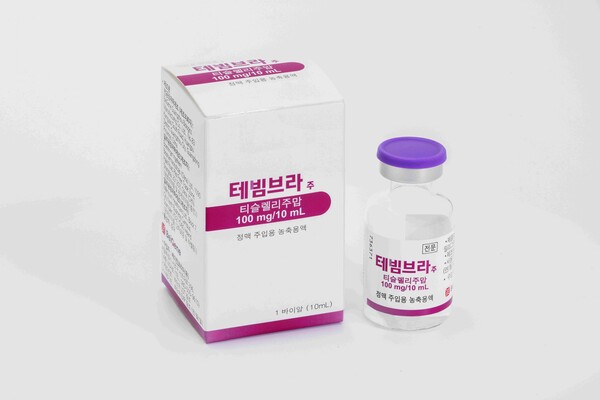BeOne Medicines Korea, the newly rebranded Korean subsidiary of global oncology company BeOne Medicines (formerly BeiGene), announced that its PD-1 inhibitor Tevimbra (ingredient: tislelizumab) has received expanded approvals from the Ministry of Food and Drug Safety (MFDS) for the treatment of esophageal cancer, gastric cancer, and non-small cell lung cancer (NSCLC).

The newly approved indications for Tevimbra include use as a first-line treatment for patients with unresectable, locally advanced, or metastatic esophageal squamous cell carcinoma (ESCC) in combination with platinum-based chemotherapy, and for those with locally advanced, unresectable, or metastatic HER2-negative gastric or gastroesophageal junction adenocarcinoma (G/GEJ), in combination with fluoropyrimidine- and platinum-based chemotherapy.
In non-small cell lung cancer (NSCLC), Tevimbra is now approved for first-line use in non-squamous NSCLC patients without EGFR or ALK mutations and with PD-L1 tumor cell expression of 50 percent or higher, alongside pemetrexed and platinum chemotherapy, in squamous NSCLC, as first-line therapy with carboplatin and paclitaxel or nab-paclitaxel, and as monotherapy in patients with previously treated, locally advanced or metastatic NSCLC.
The newly approved indications are supported by data from the company’s RATIONALE clinical trial program, including RATIONALE-303, 304, 305, 306, and 307.
Notably, Tevimbra demonstrated significant clinical benefit in patients with esophageal squamous cell carcinoma and gastric or gastroesophageal junction adenocarcinoma.
The studies showed consistent results across both the overall patient population and pre-specified subgroups based on PD-L1 expression levels. Its clinical value has been recognized in global guidelines such as the National Comprehensive Cancer Network (NCCN) and the European Society for Medical Oncology (ESMO), where it is recommended at a high level.
Tevimbra is designed to block PD-L1 with high efficiency while minimizing binding to Fc-gamma receptors (FcγRs), delivering a differentiated dual mechanism of action.
The therapy blocks the PD-1/PD-L1 immune checkpoint pathway, commonly used by cancer cells to evade immune attack, with more than 99 percent inhibition efficiency. It also has a half-life 30 to 80 times longer than existing therapies, offering potential for longer-lasting efficacy and reduced dosing frequency, and reduces affinity for FcγRs, enhancing the durability and consistency of immune responses by minimizing unintended immune activation.
“Backed by its differentiated mechanism and long-term clinical data, tebotelimab has emerged as a new standard in immuno-oncology, offering not only comparable outcomes to global references but also improved treatment durability and financial predictability,” BeOne Medicines Korea General Manager Yang Ji-hye said. “We are especially proud that tebotelimab is the only immunotherapy approved in Korea for first-line treatment of esophageal squamous cell carcinoma regardless of PD-L1 expression, offering a new option for underserved patients.”
BeOne Medicines, which recently rebranded from BeiGene under the global vision of “Be One Against Cancer,” is accelerating the expansion of its next-generation oncology pipeline.
The company is now headquartered in Switzerland and is actively advancing programs in antibody-drug conjugates (ADCs), protein degraders, and other novel modalities.
In line with this shift, BeOne Medicines Korea will complete its formal name change on June 30. The Korean subsidiary currently markets two products covering 11 indications and aims to expand its presence in both the solid tumor and hematologic malignancy treatment markets.
Related articles
- Beigene rebrands as BeOne Medicines, Korea unit to adopt new name from June 30
- Merck’s Tepmetko, BeOne Medicines’ Tevimbra to be covered by insurance starting April
- Insurance review panel gives green light to Tevimbra, Ofev, and Pemazyre
- BeOne bets Tevimbra will beat rivals to PD-1 reimbursement in Korea

